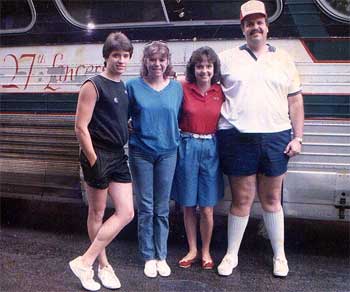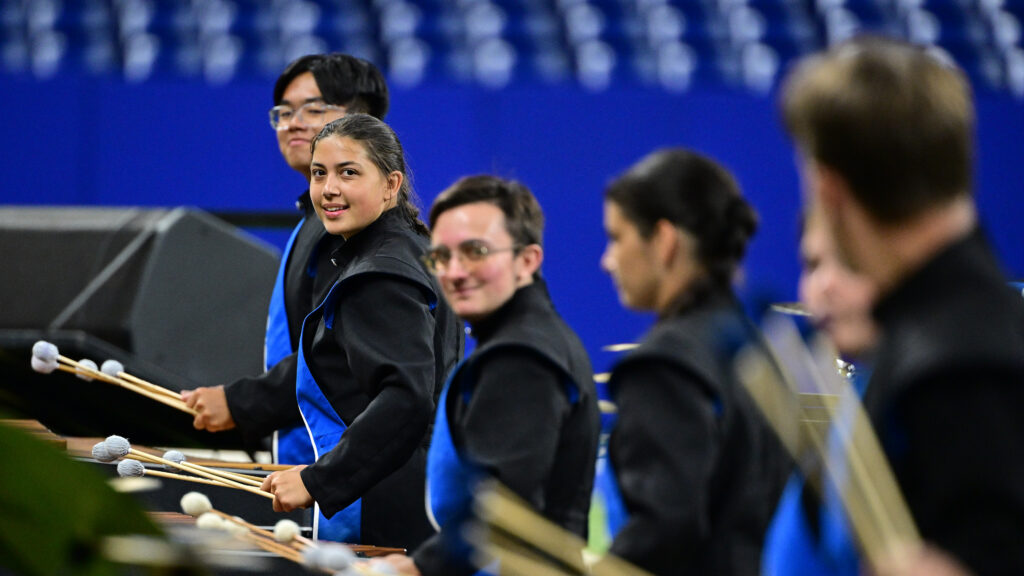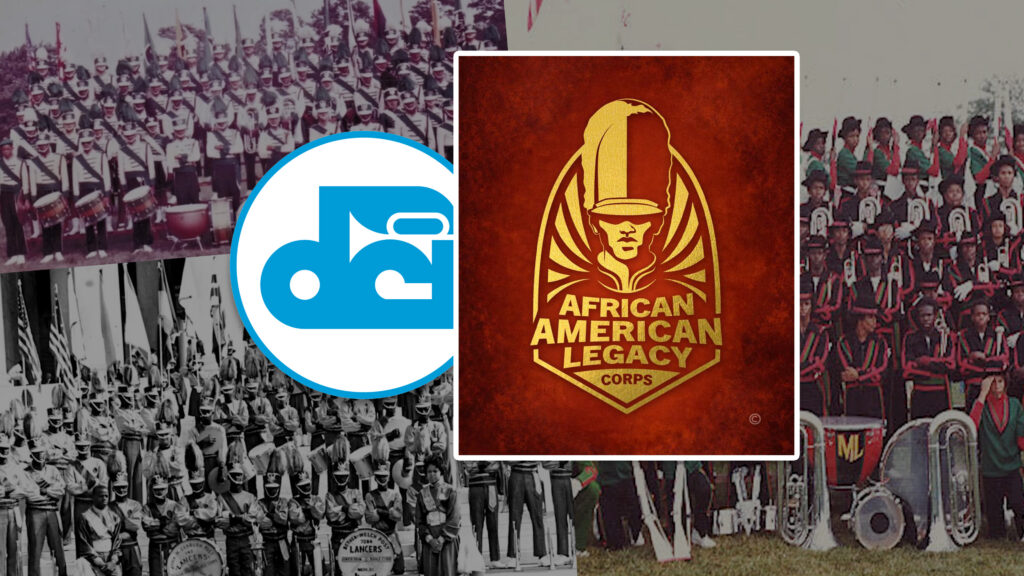For a drum corps member, there are few things more distressing than finding out your corps is folding. Fortunately, this has been happening substantially less now than it did in the past, but on the rare occasion when it does happen, many people are left traumatized by the incident.
Stephanie (Alexander) Louden has a unique perspective on surviving a corps folding. It happened to her twice. Incidentally, Stephanie and her husband celebrate their one-year anniversary on Sept. 27. They are presently the webmasters of the official 27th Lancers website at www.27thlancers.net.

The following are Stephanie’s own words. I’d like to start out by saying I’m an alumnus of 27th Lancers from Revere, Mass., a great drum and bugle corps that folded in 1986 in which I played mellophone. I’m also an alumnus of the Memphis Blues Brass Band. That was my first drum and bugle corps. My name is Stephanie (Alexander) Louden and this is a story about surviving the folding of two great drum and bugle corps.
I was 16 years old when Robin Wofford approached me in my high school and asked me if I wanted to march with a drum and bugle corps. He was a student teacher at my high school and now assists in running the show in Kennesaw, Ga. The majority of my bandmates were involved in this corps, and I knew about it as we’d gather together at our band director’s house and watch DCI on PBS and have our annual finals get-together.
I would dream about being involved in a corps, but didn’t know if I could make it. I was a little klutzy kid, but I could play the French horn. I was also shy, but the intelligent type. So Robin said, “Come check it out and try out, if you make it, it’ll change your life forever.” Boy, was he right. I tried out and made it into the French horn line.
I didn’t really know much about what I was doing, but I made it through the first season. I remember marching at the DCI World Championships in Montreal, Canada, in 1982, and we were playing our closer, “Can’t Help Falling in Love.” The emotion was so awesome and we placed in the top 20 that year.
I was hooked. I came back in 1983 and switched to mellophone. There were some recruiting and management issues, and neighbors were pressing the noise issue, claiming that since we didn’t live at the corps hall, we shouldn’t be allowed to practice there, either. We had some talent, but the corps was smaller in numbers, though not in heart. We became much closer as a corps.
We finished the mid-season DCI South show in Birmingham, Ala., and I’ll never forget the heart-breaking night. The corps director, George Lindstrom, called us under the bleachers and told us were folding and wouldn’t be finishing off the rest of the season. I couldn’t believe it. A lot of my friends in the corps that I was in high school with were thinking about going to the 27th Lancers.
I was too devastated to go anywhere. Some went to the Sky Ryders, and others went elsewhere. I decided I wasn’t going to march anymore. I was too heartbroken, because when you get close to people you spend every day with for months at a time, it’s like losing a family member. However, when 1984 rolled around, my friend Jennifer called me to come visit her in Bloomington, Ind.
At the time, Star of Indiana was the new hot corps in town. She was thinking about marching and wanted me to think about it. I went up for a visit and we went to see the Bloomington DCI show. 27th Lancers were there. I first fell in love with 27th when I saw them in 1982 in Montreal. I loved the uniforms and the way they carried themselves. I used to tell my friends that one day I’d march with them.
I ran into some friends from Memphis Blues who had marched 27th and learned they needed to fill a French horn spot. I couldn’t believe it! It was the middle of tour and I was thinking about doing it. I called home and asked my folks. They wired me some money and I hopped on a bus and went up to Revere on the bus. Jennifer was surprised, but she understood.
I had a chance to march with a top 12 drum and bugle corps, but it wasn’t just any corps, it was the 27th Lancers! So, I tried my best to learn the show in a week, but I had a hard time and ended up filling in as a backfield conductor. I was asked to come back and try out in 1985. I did so and made the mellophone line. I would fly from Memphis to Boston in May, and work before the tour started.
We didn’t make finals that year, but we were a very close corps. The styles were changing and we tried to change with the style, but for some reason we didn’t make it. We got beaten out of finals by mere tenths. 1986 was going to be our comeback year, but I was debating on whether I would go back to 27th or try out for Star of Indiana. I knew if I aged out, I would be considered a true alumnus of a great corps, so I chose to go back to 27th Lancers.
My mom and dad couldn’t understand why I wanted to do it, so I had to pay my own way this time. I worked hard and saved money for my plane ticket and flew up to Boston and worked part time in security, in addition to putting in long hours of practice. I lived at the corps hall most of the time and the rest of the time I had the honor of living with George Bonfiglio and his family.
George is one of the founding fathers of DCI and a member of the DCI Hall of Fame. This man instilled some great qualities in us kids that I still use to this day. 1986 was a different year for us; there was no more “Danny Boy,” and our uniforms changed for the second year in a row. We put on a great show at semifinals, but even though the late, great George Zingali wrote our drill, we once again missed making finals by a microscopic margin.
We couldn’t believe it! We also had some major bus breakdowns along the way, and thanks to Star of Indiana and the buses they sent to us, we made it through to Madison. Another heartbreaking night was my age-out night, when George Bonfiglio called us up to a hill in Madison and stated that he was sad to say that 27th Lancers would be no more, that he could not do the corps justice until we got some decent equipment and buses.
After all the breakdowns, George decided the safety of the kids was of utmost importance. I couldn’t believe it, another great corps was folding, and on the night I aged out. But something fantastic happened that night in the spirit of brotherhood. Star and us developed a friendship. They had respect for us and Bill Cook helped us out a lot.
That night, Star formed a circle around us and sang a good-bye song to one of the greatest corps in history. The members of Star also went back inside the stadium and put their shoes and gloves on the field, as did some of us who were aging out, forming a “27” on the field after Finals. We got back together in the parking lot and sang “Danny Boy” at the top of our lungs.
This year, I saw SPIRIT’s tribute to 27th Lancers, as well as their tribute to the Bridgemen, George Zingali and Gail Royer. It was a great thing to see kids learning about the history of drum and bugle corps through the tribute. The lessons I learned remain with me to this day. I learned a lot about surviving, but I also learned that I was a part of history, of something that will live with me for the rest of my life.
I am still friends with the Bonfiglios, and a lot of my instructors have moved on to other corps. What a great lesson of survival. We really did live “The Impossible Dream.” Michael Boo has been involved with drum and bugle corps since 1975, when he marched his first of three seasons with the Cavaliers.
He has a bachelor’s degree in music education and a masters degree in music theory and composition.
He has written about the drum corps activity for over a quarter century for publications such as Drum Corps World, and presently is involved in a variety of projects for Drum Corps International, including souvenir program books, CD liner notes, DCI Update and Web articles, and other endeavors.
Michael currently writes music for a variety of idioms, is a church handbell and vocal choir director, an assistant director of a community band, and a licensed Realtor in the state of Indiana. His other writing projects are for numerous publications, and he has published an honors-winning book on the history of figure skating. His hobbies include TaeKwonDo and hiking the Indiana Dunes. But more than anything, Michael is proud to love drum corps and to be a part of the activity in some small way, chronicling various facets of each season for the enjoyment of others.





